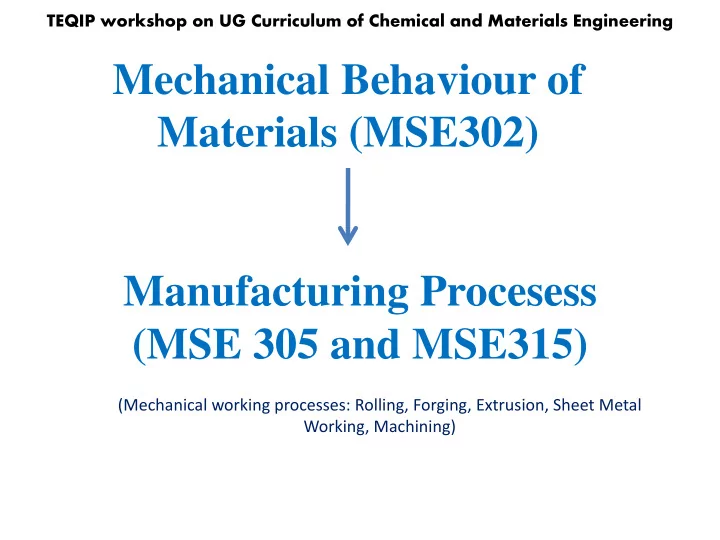

TEQIP workshop on UG Curriculum of Chemical and Materials Engineering Mechanical Behaviour of Materials (MSE302) Manufacturing Procesess (MSE 305 and MSE315) (Mechanical working processes: Rolling, Forging, Extrusion, Sheet Metal Working, Machining)
TEQIP workshop on UG Curriculum of Chemical and Materials Engineering Course Content: Lecture (3-0-0-9) and Lab (3-0-0-3) – Elasticity (Stress state, Mohr cycle, strain tensors, Non-linear elasticity – Plasticity (Yield criteria, stress-strain curves, slip and twinning) – Dislocations (Motion, Burger, Forces, Interactions, stacking fault etc.) – Applications : Strengthening mechanisms :Fatigues and Fracture : Creep Case studies group task for the same group as that in MSE 313A at IITK – Mechanical Behaviour Laboratory (Projects)
TEQIP workshop on UG Curriculum of Chemical and Materials Engineering Texts: Mechanical Metallurgy, G. E. Dieter • Mechanical Behaviour of Materials, Courtney • Mechanical Behaviour of Materials, M. A. Meyers and K. K. Chawla • Deformation Behaviour and Fracture Mechanics of Engineering Materials, • R. W. Hertzberg Introduction to dislocations, Hull and Bacon • Theory of dislocations, Hirth and Lothe • Fracture Mechanics: fundamentals and applications, Anderson • Fatigue of Materials, S. Suresh • Mechanical Testing of Metals, ASM handbook •
TEQIP workshop on UG Curriculum of Chemical and Materials Engineering Basic elasticity Definition of stress and strain, displacement gradient tensor and rotation tensor, tensorial notation, Hooke’s law, Atomistic aspects of Hooke’s law (Bonding), Plane stress and Plane strain condition, Linear continuum, isotropic and anisotropic elasticity, Shear and bulk modulus, non-linear elasticity and viscoelasticity, rule of mixtures
TEQIP workshop on UG Curriculum of Chemical and Materials Engineering Plasticity Limit of elasticity and transition from elastic to plastic deformation, deviatoric and hydrostatic stress, uniaxial and multiaxial plasticity, von Mises and Tresca criterion, Drucker’s postulate, yield locus, flow rule, hardening models, tensile stress-strain curve and other material properties, Introduction to tension, compression and torsion Dislocation mechanisms Introduction to dislocations in crystalline materials, Edge, screw and mixed dislocations, Dislocation line vector and Burgers vector, stress field of dislocations, movement of dislocations, Cross slip and climb, Dislocation-dislocation and dislocation-point defect interaction, Formation of jogs, kinks and different dislocation reactions in fcc and bcc materials, introduction to dislocations in hcp materials, Stacking fault in fcc materials, Twinning in fcc materials
TEQIP workshop on UG Curriculum of Chemical and Materials Engineering Strengthening mechanisms Dislocation strengthening, grain size strengthening, precipitation hardening, dispersion hardening, martensitic hardening, Introduction to hydrogen embrittlement and stress corrosion cracking Fracture Brittle and ductile fracture, Griffith criterion and Orowan’s rule, Introduction to crack tip opening displacement and J integral, introduction to energy release rate, Fracture toughness, metallurgical aspects of fracture using fractography
TEQIP workshop on UG Curriculum of Chemical and Materials Engineering Fatigue Failure below fracture stress: insidious failure, High cycle and low cycle fatigue, Empirical fatigue models, Paris law and fracture toughness, Microstructural mechanisms of prolonged fatigue lifetime Creep and stress rupture Time dependent plastic deformation, Empirical creep models, stress rupture, deformation mechanism maps, strategies to mitigate creep and rupture, introduction to superalloys
TEQIP workshop on UG Curriculum of Chemical and Materials Engineering Mini Projects 1. Make your own putty silly !!! (to study time dependent behaviour of materials by making silly putty from borax and gum) 2. Origami to prepare Thompsons Tetrahedron and understand dislocations in fcc crystals 3. Beyond Hall-Petch: Try to obtain best fit for grain size vs. yield strength data 4. Egg-drop challenge 5. Research presentation
TEQIP workshop on UG Curriculum of Chemical and Materials Engineering Lab experiments Sr. Name of experiment No. 1 Tensile Test of aluminium and teflon: calculate yield strength, plot true stress-true strain and other related parameters from load-displacement data. Different batches perform test at different strain rates to study rate effects 2 Hardness test: introduction to different type of hardness tests 3 Strain aging experiment 4 Rotating bending fatigue experiment 5 Creep experiment on lead alloy 6 Ductile to brittle transition temperature using Charpy impact test 7 Effect of cold working on tensile behaviour of steel
TEQIP workshop on UG Curriculum of Chemical and Materials Engineering Lab projects (1 for each group) Sr. Name of experiment No. 1 Cryo rolling of 304 stainless steel 2 Pseudo in-situ deformation of 304 SS using Differential Imaging Contrast 3 Failure analysis of real life components 4 Study of heat affected zone in welded steel 5 Precipitation hardening of steel 6 Hydrogen embrittlement in steels
TEQIP workshop on UG Curriculum of Chemical and Materials Engineering Outdoor classes (N.P.Gurao)
TEQIP workshop on UG Curriculum of Chemical and Materials Engineering (N.P.Gurao)
TEQIP workshop on UG Curriculum of Chemical and Materials Engineering (N.P.Gurao)
TEQIP workshop on UG Curriculum of Chemical and Materials Engineering New Experiments (out of the box!!!) Biology Mechanical Behaviour of Living Cells or even biological tissues (dead/ alive) (Difficult and Expensive!) (Relatively easy and not so expensive!) (Prof S.Suresh, MIT)
Recommend
More recommend